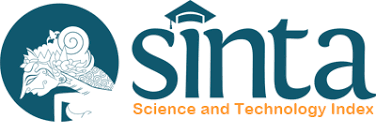The Relationship Between Perceived Benefits With Implementation Of Household Clean And Healthy Lifing Behaviors During The Covid-19 Pandemic
Keywords:
Covid-19, PHBS, HouseholdAbstract
Covid-19 was designated by WHO as a global pandemic in March 2020, for this reason the government issued policies, promotive and preventive services, in this case, calling for the implementation of Clean and Healthy Life Behavior (PHBS) including household. PHBS itself has not been fully implemented in the community, if you refer to this that health problems in the community are caused by habits and perceptions, this is expressed by Rosenstock regarding the Health Belief Model, especially perceived severity. Based on data from the Maros District Health Office in Simbang District, the coverage of PHBS is 25% and those who have not PHBS are 75%. This study aims to determine the relationship between the perceived benefit approach and the application of household PHBS during the Covid-19 pandemic in the community of Simbang Village, Maros Regency. The research method used is a quantitative study with a cross-sectional design. The population in this study is the community in this case housewives who have babies/toddlers totaling 290 people. Sampling by purposive sampling method with a total of 166 people. The data analysis method used a bivariate test with a Chi-Square correlation test. The results showed the results of the Chi-Square test variable perceived benefit (p-value 0.192). Based on the results of the study, it was concluded that there was no relationship between the perception of benefits and the application of household PHBS, which was due to other factors that dominated the community in implementing household PHBS during the Covid-19 pandemic.
References
WHO,“Weekly epidemiology update,” who.int, 2020.
https://www.who.int/emergencies/diseases/novel-coronavirus-2019/situation-reports.
R. C. Afro, “Analisis Faktor Yang Mempengaruhi Kepatuhan Terhadap Protokol Kesehatan Saat Pandemi Covid-19 Pada Masyarakat Jawa Timur: Pendekatan Health Belief Model,” J. Community Ment. Heal. Public Policy, vol. 3, no. 1, pp. 1–10, 2021, doi: 10.51602/cmhp.v3i1.43.
SulSel Tanggap Covid-19, “Data Pantauan Covid-19 Di Sulawesi Selatan,” covid19.sulseslprov.go.id, 2021. https://covid19.sulselprov.go.id/data.
M. G. Petra Suluh, “Pendekatan Health Belief Model Dalam Penerapan Protokol Kesehatan Masa Pandemi Covid-19 Di Kabupaten Kupang,” Nusa Cendana, 2021.
A. O. Suryani and O. M. Purwodiharjo, “Aplikasi Health Belief Model Dalam Penanganan Pandemi Covid-19 Di Provinsi Dki Jakarta,” J. Perkota., vol. 12, no. 1, pp. 21–38, 2021, doi: 10.25170/perkotaan.v12i1.1262.
M. J. Gomo, J. M. L. Umboh, and A. J. Pandelaki, “Gambaran Perilaku Hidup Bersih Dan Sehat (Phbs) Sekolah Pada Siswa Kelas Akselerasi Di Smpn 8 Manado,” J. e-Biomedik, vol. 1, no. 1, pp. 503–505, 2013, doi: 10.35790/ebm.1.1.2013.4590.
K. Glanz, B. K. Rimer, and V. Kasinadhuni, Health Behavior And Health Education, 4th ed. 2008.
et al Priyo, “Efektifitas Penerapan Health Belief Model Terhadap Perilaku Hidup Bersih dan Sehat (PHBS),” vol. 5, no. 2, pp. 88–105, 2018, [Online]. Available: https://journal.unimma.ac.id/index.php/nursing/article/view/2447/1350.
E. D. Kaniawati, D. L. Badriah, L. Wahyuniar, S. Susianto, and A. Ropii, “Pengaruh Intervensi Health Belief Model Dan Seft Terapi Terhadap Perilaku Merokok Pada Kelompok Upaya Kesehatan Berbasis Masyarakat Rotusu (Rokok Untuk Susu Dan Protein Lainnya) Di Kecamatan Rancah 2020,” J. Public Heal. Innov., vol. 2, no. 1, pp. 76–92, 2021, doi: 10.34305/jphi.v2i1.322.
F. Tentama, “Penerapan Perilaku Hidup Bersih Dan Sehat (Phbs) Demi Kesejahteraan Masyarakat Kecamatan Tuntang Kabupaten Semarang Jawa Tengah,” J. Pemberdaya. Publ. Has. Pengabdi. Kpd. Masy., vol. 1, no. 1, p. 13, 2018, doi: 10.12928/jp.v1i1.309.
M. Dinkes, “Rekapitulasi PHBS Tatanan Rumah Tangga Kabupaten Maros 2020,” 2020.
Rosentock, “Historical Origins of The Health Belief Model. Health Education Monographs,” Health Educ. Monogr., vol. 2, no. 4, pp. 328--335, 1974, [Online]. Available: https://doi.org/http://dx.doi.org/10.1177/109019817400200403.
Depkes RI, “Booklet Perilaku Hidup Bersih dan Sehat di Rumah Tangga,” Dep. Kesehat. RI, pp. 1–48, 2014.
Zulkarni, R. Yosmar, and F. Yuliagus, “Gambaran Perilaku Keluarga Dalam Swamedikasi Melalui Pendekatan Teori Health Belief Model (HBM) di Kecamatan Kinali,” Bus. Manag. Entrep. J., vol. 2, no. December 2018, pp. 1–11, 2019.
Herlina H, Yusriani Y, Idris FP. Pendekatan Health Belief Model Dalam Komunikasi Interpersonal Tentang Protokol Kesehatan Antara Ibu Hamil dan Petugas Kesehatan: Health Belief Model Approach in Interpersonal Communication About Health Protocols Between Pregnant Women and Health Workers. Journal of Muslim Community Health. 2021 Oct 13;2(4):41-55.
S. Mindayani and H. Hidayat, “Analisis Perilaku Pencegahan Penularan HIV/AIDS Dengan Pendekatan Health Belief Model (HBM) Pada WBP Di Lapas Kelas IIA Padang,” J. Kesehat., vol. 7621, no. 1, pp. 33–43, 2019.
Asrina A, Yusriani Y, Bahtiar H, Reski MA, Ramadhani ADB, Rumae DIA. Program Promosi Kesehatan Untuk Mewujudkan Indikator PHBS Pada Tatanan Pendidikan Di Pondok Pesantren An-nahdlah Makassar. ABDIMAN [Internet]. 2022 Aug. 10 [cited 2022 Nov. 12];1(8):1319-26. Available from: https://www.bajangjournal.com/index.php/JPM/article/view/2744
Rahman R, Sididi M, Yusriani Y. Pengaruh Pengetahuan Dan Sikap Terhadap Partisipasi Masyarakat Dalam Pengelolaan Sampah Di Kampung Nelayan Untia. Jurnal Surya Muda. 2020 Aug 31;2(2):119-31.

















